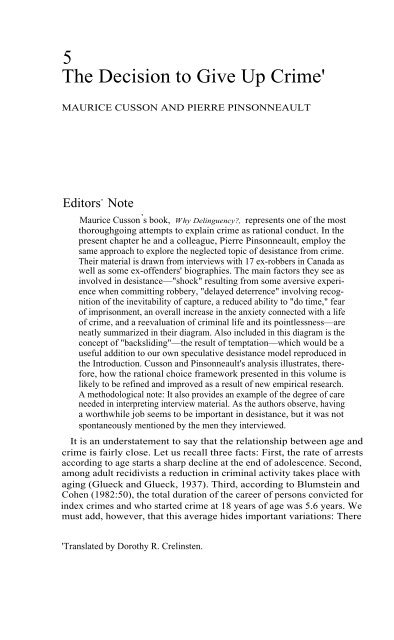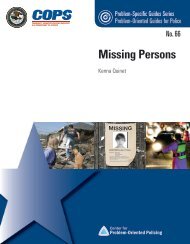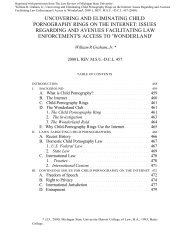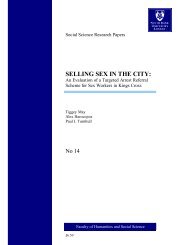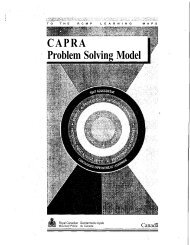The Decision to Give Up Crime - Center for Problem-Oriented Policing
The Decision to Give Up Crime - Center for Problem-Oriented Policing
The Decision to Give Up Crime - Center for Problem-Oriented Policing
You also want an ePaper? Increase the reach of your titles
YUMPU automatically turns print PDFs into web optimized ePapers that Google loves.
5<br />
<strong>The</strong> <strong>Decision</strong> <strong>to</strong> <strong>Give</strong> <strong>Up</strong> <strong>Crime</strong>'<br />
MAURICE CUSSON AND PIERRE PINSONNEAULT<br />
Edi<strong>to</strong>rs ' Note<br />
Maurice Cusson ' s book, Why Delinguency?, represents one of the most<br />
thoroughgoing attempts <strong>to</strong> explain crime as rational conduct. In the<br />
present chapter he and a colleague, Pierre Pinsonneault, employ the<br />
same approach <strong>to</strong> explore the neglected <strong>to</strong>pic of desistance from crime.<br />
<strong>The</strong>ir material is drawn from interviews with 17 ex-robbers in Canada as<br />
well as some ex-offenders' biographies. <strong>The</strong> main fac<strong>to</strong>rs they see as<br />
involved in desistance—"shock" resulting from some aversive experience<br />
when committing robbery, "delayed deterrence" involving recognition<br />
of the inevitability of capture, a reduced ability <strong>to</strong> "do time," fear<br />
of imprisonment, an overall increase in the anxiety connected with a life<br />
of crime, and a reevaluation of criminal life and its pointlessness—are<br />
neatly summarized in their diagram. Also included in this diagram is the<br />
concept of "backsliding"—the result of temptation—which would be a<br />
useful addition <strong>to</strong> our own speculative desistance model reproduced in<br />
the Introduction. Cusson and Pinsonneault's analysis illustrates, there<strong>for</strong>e,<br />
how the rational choice framework presented in this volume is<br />
likely <strong>to</strong> be refined and improved as a result of new empirical research.<br />
A methodological note: It also provides an example of the degree of care<br />
needed in interpreting interview material. As the authors observe, having<br />
a worthwhile job seems <strong>to</strong> be important in desistance, but it was not<br />
spontaneously mentioned by the men they interviewed.<br />
It is an understatement <strong>to</strong> say that the relationship between age and<br />
crime is fairly close. Let us recall three facts: First, the rate of arrests<br />
according <strong>to</strong> age starts a sharp decline at the end of adolescence. Second,<br />
among adult recidivists a reduction in criminal activity takes place with<br />
aging (Glueck and Glueck, 1937). Third, according <strong>to</strong> Blumstein and<br />
Cohen (1982:50), the <strong>to</strong>tal duration of the career of persons convicted <strong>for</strong><br />
index crimes and who started crime at 18 years of age was 5.6 years. We<br />
must add, however, that this average hides important variations: <strong>The</strong>re<br />
'Translated by Dorothy R. Crelinsten.
5. <strong>The</strong> <strong>Decision</strong> <strong>to</strong> <strong>Give</strong> <strong>Up</strong> <strong>Crime</strong> 73<br />
are offenders who start their adult career at 18 and end it in their<br />
<strong>for</strong>ties.<br />
<strong>The</strong>se findings would be inconceivable if desistance from crime were<br />
not a frequent occurrence. Offenders give up crime almost as often as<br />
they get in<strong>to</strong> it. To die a criminal, one would almost have <strong>to</strong> die a violent<br />
death.<br />
Dropout rates from criminal careers are rather variable. Blumstein and<br />
Cohen (1982:38) noted three periods: from 20 <strong>to</strong> 30 years of age, from 30 <strong>to</strong><br />
42 years, and from 43 <strong>to</strong> 60 years. Between the ages of 20 and 30 the<br />
dropout rates are fairly high; they are fairly low between 30 and 42, and<br />
from 42 <strong>to</strong> 60 they become quite high again. <strong>The</strong> physical wear and tear, it<br />
seems, <strong>for</strong>ces people <strong>to</strong> retire.<br />
We know that most offenders give up crime eventually. But what else<br />
do we know? What makes a person decide <strong>to</strong> s<strong>to</strong>p committing crimes?<br />
What are the reasons behind such a decision? What are the circumstances?<br />
<strong>The</strong> timing? Interviews with ex-offenders are essential if we are<br />
<strong>to</strong> understand the decision-making process that puts an end <strong>to</strong> a criminal<br />
career. Very few researchers have done this, and understandably so. It is<br />
not easy <strong>to</strong> trace, contact, and interview ex-prisoners who have been out<br />
of the system <strong>for</strong> several years. It was only after some difficulty that we<br />
succeeded in interviewing a small group of 17 ex-offenders and asking<br />
what made them put an end <strong>to</strong> their criminal activities. <strong>The</strong>se men had<br />
all committed armed robbery. <strong>The</strong>y were recidivists. <strong>The</strong>y were between<br />
30 and 40 years of age and had not been arrested during the course of the<br />
5 preceding years. Later we learned that almost all of them had<br />
committed their last crime between the ages of 20 and 30.<br />
<strong>The</strong>re are further signs that our interviewees had really given up crime.<br />
First, be<strong>for</strong>e the interview, we <strong>to</strong>ld our subjects that the <strong>to</strong>pic would be the<br />
abandonment of crime; second, what they <strong>to</strong>ld us of their present life<br />
convinced us that they had actually given up crime. A detailed<br />
description of the methodology and of the data has been published<br />
elsewhere (Pinsonneault, 1984).<br />
Our findings are mainly based on the statements of these men.<br />
However, <strong>to</strong> complete this source, which we must admit is far from being<br />
comprehensive, we have consulted a number of au<strong>to</strong>biographies written<br />
by ex-offenders. We also refer <strong>to</strong> a few studies on the subject.<br />
Shock<br />
<strong>The</strong> decision <strong>to</strong> give up crime is generally triggered by a shock of some<br />
sort, by a delayed deterrence process, or both (see Figure 5.1). Conwell's<br />
remark in <strong>The</strong> Professional Thiefis still valid: " It is generally necessary <strong>for</strong><br />
the thief <strong>to</strong> suffer some shock or jolt be<strong>for</strong>e he will face the future<br />
seriously" (Sutherland, 1937: 182).<br />
It was often during the commission of their last crime that our subjects
74 Maurice Cusson and Pierre Pinsonneault<br />
FIGURE 5.1. <strong>The</strong> decision-making process in desistance from crime.<br />
suffered this shock. One of them was wounded by the police during a<br />
shoot-out as he was leaving a bank. Another saw his partner killed by<br />
police bullets. A third <strong>to</strong>ld us that his accomplice had tried <strong>to</strong> kill him <strong>to</strong><br />
get his share of the loot.<br />
It frequently happens, <strong>to</strong>o, that the crime that precedes the decision <strong>to</strong><br />
s<strong>to</strong>p takes place in a climate of intense fear that culminates in sheer<br />
panic. In his au<strong>to</strong>biography, Malcolm Braly (1976) tells the s<strong>to</strong>ry of his
5. <strong>The</strong> <strong>Decision</strong> <strong>to</strong> <strong>Give</strong> <strong>Up</strong> <strong>Crime</strong> 75<br />
last attempt at burglary. It is so apt that it is worth citing even though it is<br />
a bit long.<br />
I went broke and convinced myself it would be a small risk <strong>to</strong> take something<br />
easy, just enough <strong>for</strong> food and rent, and I was out in the night, prowling a nursery<br />
and garden-supply house, when the lights of a squad car washed over me, and I<br />
was sure they had spotted me crouched there in the underbrush. I bolted in an<br />
instant panic <strong>to</strong> run stumbling and frequently falling across a large empty lot,<br />
expecting at any moment <strong>to</strong> see spotlights ahead. I would be snared from the<br />
darkness like a terrified rabbit.<br />
<strong>The</strong> last time 1 fell I landed in a small stand of underbrush, and crawled deeper<br />
in<strong>to</strong> this thin cover <strong>to</strong> lie gasping with exhaustion. My throat burned with a deep<br />
and painful fire and I was far more alarmed at the erratic hammering of my own<br />
heart than I was at the possibility I might be questioned by the police.<br />
How grotesque I seemed <strong>to</strong> myself. <strong>The</strong> boy who had climbed the sides of<br />
buildings with such a reckless heart was gone, and in his place had appeared this<br />
middle-aged man who knew only one way <strong>to</strong> fail... .<br />
I decided that night on the boldest move I thought possible and I wrote Knox<br />
Burger asking him <strong>to</strong> loan me the fare <strong>to</strong> New York, <strong>to</strong> the Magic City, and this<br />
good man telegraphed me the money within an hour of receiving my plea <strong>for</strong><br />
help. Once more I set off in pursuit of my real life. (Braly, 1976: 372)<br />
Other times, the shock takes the <strong>for</strong>m of a very severe sentence and all<br />
that goes with it. <strong>The</strong> man condemned <strong>to</strong> a long prison sentence loses not<br />
only his freedom; he can also lose someone dear <strong>to</strong> him. Alone in his cell<br />
he learns one day that his wife is unfaithful, that she has become a<br />
prostitute, that she has asked <strong>for</strong> a divorce, or that she has committed<br />
suicide. Some of the men we interviewed had in fact lost either a wife or<br />
an intimate girlfriend.<br />
A French armed robber who had killed a policeman during a shoot-out<br />
was condemned <strong>to</strong> death and spent 13 months in the death cell be<strong>for</strong>e<br />
being reprieved. This experience, he writes, made him a different man: "I<br />
began <strong>to</strong> ask myself questions about life, death, the mystery of creation "<br />
(Guillo, 1977: 210). A few years later, his wife, who had refused <strong>to</strong> ask <strong>for</strong> a<br />
divorce, died of cancer, and he was unable <strong>to</strong> get out of prison <strong>to</strong> go and<br />
see her.<br />
Delayed Deterrence<br />
<strong>The</strong> men began <strong>to</strong> see the entire criminal justice system as an apparatus which<br />
clumsily but relentlessly swallows offenders and wears then down. (Shover. 1983:<br />
212)<br />
At first glance, multirecidivists are living examples of the ineffectiveness<br />
of punishment. Yet there seems <strong>to</strong> be a relationship between the fear of<br />
punishment and the abandoning of crime. Men who <strong>for</strong> years could not
7 6 Maurice Cusson and Pierre Pinsonneault<br />
be intimidated despite many severe punishments end by deciding <strong>to</strong> go<br />
straight mainly because they do not want <strong>to</strong> go back <strong>to</strong> prison.<br />
Delayed deterrence is the gradual wearing down of the criminal drive<br />
caused by the accumulation of punishments. In the long run, the<br />
succession of arrests and incarcerations do have their effect. <strong>The</strong>y<br />
engender a pervasive fear, which over the years becomes acute and makes<br />
acting out more and more difficult.<br />
This delayed deterrence has four components: (a) a higher estimate of<br />
the cumulative probability of punishment, (b) the increasing difficulty of<br />
" doing time, " (c) an awareness of the weight of previous convictions on<br />
the severity of the sentences, and (d) a spreading of fear.<br />
Higher Estimate of the Likelihood of Punishment<br />
It is clear that, with age, criminals raise their estimates of the certainty of<br />
punishment. <strong>The</strong>y come <strong>to</strong> terms with the simple fact that the more<br />
crimes they commit, the greater the cumulative probability of arrest. This<br />
fact is often overlooked; people seem <strong>to</strong> think that the probability that an<br />
offender will be arrested is equal <strong>to</strong> the probability of being arrested <strong>for</strong> a<br />
single crime. This obviously does not apply <strong>to</strong> the career criminal. What<br />
must be considered in the career criminal's case is the cumulative<br />
probability of punishment—that which is calculated on the <strong>to</strong>tal number<br />
of his or her crimes. Young delinquents generally do not realize that each<br />
new crime increases the probability of their being caught. On the other<br />
hand, all the ex-convicts that we met agreed that those who commit<br />
crimes regularly sooner or later run the risk of finding themselves behind<br />
bars. <strong>The</strong>re is a term <strong>for</strong> this in Canadian penitentiaries: "the law of<br />
averages" (also noted by Letkemann, 1973, p.37). As expressed by one of<br />
our interviewees, " Every time you commit one, you risk being arrested.<br />
<strong>The</strong> law of averages is against you; the prisons are there <strong>to</strong> prove it. " With<br />
age, the criminal comes <strong>to</strong> the conclusion that theft is a bad risk: " If you<br />
steal, you'll find yourself inside fast enough, because the odds are against<br />
you. You ' re known <strong>to</strong> the cops; you may have more experience, but you ' re<br />
not as quick. "<br />
Increasing Difficulty of Prison Life<br />
<strong>The</strong> ex-offenders that we met were unanimous in acknowledging that,<br />
with age, it is more and more difficult <strong>to</strong> do time. (Maguire, 1982:8, made<br />
the same observation that with age the prison seems <strong>to</strong> be " more painful<br />
than in the past.") As they grow older they can no longer stand prison life<br />
and the company of other inmates. Even more important, they feel very<br />
keenly that they are wasting time and ruining their lives. Braly (1976)<br />
experienced this feeling while serving his last sentence. "I had seldom<br />
pulled time as hard as this. I had always had my real life <strong>to</strong> look <strong>for</strong>ward<br />
<strong>to</strong>. Now it seemed it might well be behind me. <strong>The</strong> waste of this precious
5. <strong>The</strong> <strong>Decision</strong> <strong>to</strong> <strong>Give</strong> <strong>Up</strong> <strong>Crime</strong> 77<br />
time appalled me " (1976:362). Shover (1983:211) likewise said of the men<br />
he interviewed, "Most of the men became acutely aware of time as a<br />
diminishing exhaustible resource. " One of his subjects, speaking of<br />
prison, said, " It's just knocking time out of my life! "<br />
Fear of Longer Sentences <strong>for</strong> Repeat Convictions<br />
We know that the more active a defendant's criminal file, the greater the<br />
risk of a long sentence. Criminals know this as well. <strong>The</strong> majority of our<br />
subjects <strong>to</strong>ld us that the fear of incurring a long prison term the next time<br />
had an influence on their decision <strong>to</strong> s<strong>to</strong>p.<br />
Increased Fear<br />
Gradually, fear infiltrates every aspect of the criminal ' s life. <strong>The</strong> armed<br />
robber, once he has the money, is afraid <strong>to</strong> leave the bank in case the<br />
police are waiting outside <strong>to</strong> shoot him. He lives in daily fear. He feels<br />
under constant stress, paranoid: " You ' re always on edge, on pills." " It ' s a<br />
strange life, <strong>to</strong>o. You ' re always nervous. Cause there ' s always something<br />
they can pin on you. You never know what's gonna happen. That makes it<br />
exciting <strong>to</strong>o, but it gets you after a while " (West, 1978:186).<br />
Assessment<br />
Thus, there comes a time when the recidivist ' s will <strong>to</strong> continue in crime is<br />
weakened by the corrosive action of delayed deterrence or by a shock of<br />
some sort. <strong>The</strong> offender then enters a period of crisis. Anxious and<br />
dissatisfied, he takes s<strong>to</strong>ck of his life and his criminal activity (Cormier et<br />
al., 1959:40; Shover, 1983:210). <strong>The</strong> conclusions he arrives at, on the<br />
whole, will be (1) that theft does not pay enough considering the risks<br />
involved ("Is it worthwhile doing 4 <strong>to</strong> 5 years <strong>for</strong> a couple of thousand<br />
dollars? " ) 2 and (2) that the whole criminal way of life has become a<br />
problem. <strong>The</strong> following is a statement made by Maguire (1982):<br />
<strong>The</strong> impetus <strong>to</strong> think seriously about retirement from crime al<strong>to</strong>gether seemed <strong>to</strong><br />
come in many cases from a gradual disenchantment with the criminal life in its<br />
<strong>to</strong>tality: the inability <strong>to</strong> trust people; the frequent harassment by the police; the<br />
effects on wives and children when the offender is in prison. (Maguire,<br />
1982:89)<br />
Our interviewees arrived at a point where their way of life seemed<br />
senseless: " I lost my taste <strong>for</strong> spending $300 <strong>to</strong> $400 a night just <strong>to</strong> show<br />
2 Let us say in passing that theft is not judged in moral but in strictly utilitarian<br />
terms. Our subjects feel no guilt and do not take the harm caused their victims<br />
in<strong>to</strong> consideration when they decide <strong>to</strong> abandon crime; it is the cost/benefit angle<br />
that counts.
7 8 Maurice Cusson and Pierre Pinsonneault<br />
off. " <strong>The</strong>y also had plenty of problems with their peers: conflicts over<br />
women, arguments over the sharing of loot, fights with rival gangs, and<br />
the like. Furthermore, it seems that at a certain age there is no longer any<br />
desire <strong>to</strong> associate with disreputable, coarse, untrustworthy, and violent<br />
people. " You can ' t have an intelligent conversation with those people. "<br />
One comes <strong>to</strong> see the underworld as a dead end.<br />
It is not hard <strong>to</strong> understand, then, that by the time they retired from<br />
crime, most of our subjects had come <strong>to</strong> believe that they would always be<br />
the losers if they continued along the same path. This feeling of failure<br />
was noted by Cormier et al. (1959:44) by Irwin (1970:156), and by Shover<br />
(1983:211).<br />
A Reevaluation of Goals<br />
Having made this assessment, the offender tries <strong>to</strong> envision the future<br />
and see what awaits him. What does he see? A long succession of incarcerations<br />
that will end only when he is old enough <strong>to</strong> receive his old-age<br />
pension. Or he sees deterioration, alcoholism, and suicide. <strong>The</strong> prospect<br />
of dying in prison seems <strong>to</strong> him the ultimate failure. " I would probably<br />
end in one of the small graveyards that are part of every prison<br />
reservation " (Braly, 1976:336; see also Carr, 1975:180, and Shover,<br />
1983:211).<br />
<strong>The</strong> glimpse of the future, then, <strong>for</strong>ces the criminal <strong>to</strong> change his<br />
course, even if it means giving up his past aspirations. As Herbert Simon<br />
(1955:111) observed, the level of aspirations tends <strong>to</strong> adjust <strong>to</strong> the realm of<br />
possibility. <strong>The</strong> person who does not succeed in getting what he wants<br />
will lower his aspirations. This is somewhat the case <strong>for</strong> the offender who<br />
decides <strong>to</strong> retire. He decides <strong>to</strong> give up the affluent life, <strong>to</strong> do without his<br />
Cadillac and be satisfied with a more modest income. (See also Cormier<br />
et al, 1959:44; Irwin, 1970:209; Shover, 1983:212.)<br />
<strong>The</strong> <strong>Decision</strong><br />
What does the decision <strong>to</strong> give up crime mean exactly? Our subjects<br />
described it as the decision never <strong>to</strong> return <strong>to</strong> prison: " I couldn ' t say that I<br />
would never start again. It could still happen. But I put my life on the line;<br />
I don ' t want <strong>to</strong> go back inside, I would rather shoot myself. " What is<br />
essential is <strong>to</strong> avoid another incarceration. It is not so much a positive<br />
decision, the desire <strong>to</strong> go straight, but a negative one, never <strong>to</strong> go back <strong>to</strong><br />
prison.<br />
Furthermore, our subjects stressed the fact that their decision was<br />
voluntary and au<strong>to</strong>nomous. <strong>The</strong>y claimed <strong>to</strong>tal responsibility and<br />
maintained that they alone made the decision <strong>to</strong> retire: "I didn't go <strong>to</strong> see<br />
anyone else, I decided on my own." "You can't count on others <strong>to</strong> decide
5. <strong>The</strong> <strong>Decision</strong> <strong>to</strong> <strong>Give</strong> <strong>Up</strong> <strong>Crime</strong> 79<br />
this sort of thing. " <strong>The</strong> decision is not made easily: " To s<strong>to</strong>p, a fellow has<br />
<strong>to</strong> want <strong>to</strong> get out of it with all his heart. " " When a fellow wants <strong>to</strong>, he can.<br />
It's wanting <strong>to</strong> that's difficult"<br />
Aging<br />
Hirschi and Gottfredson (1983) convincingly made the point that there is<br />
a direct connection between age and crime. In the case of those<br />
individuals who s<strong>to</strong>p committing crimes at the end of adolescence, one<br />
can speak of normal maturation. For those who s<strong>to</strong>p during their thirties,<br />
Cormier et al. (1965:10) and the Gluecks (1974:169) put <strong>for</strong>ward the<br />
concept of late maturation. <strong>The</strong>re comes a time when the offender<br />
acquires the ability and control required <strong>to</strong> keep him from committing<br />
further crimes.<br />
At the point when they gave up their criminal careers, the men we met<br />
had the impression of having become more realistic, more prudent, and<br />
more mature. <strong>The</strong>ir temporal perspectives were broadened. <strong>The</strong>y had<br />
evolved <strong>to</strong> a point where their life ceased being a matter of drifting in<strong>to</strong> a<br />
series of disconnected episodes <strong>to</strong> become oriented <strong>to</strong>ward the future.<br />
According <strong>to</strong> these men, the process of maturation that takes place with<br />
age was accelerated by a number of experiences, some of which had<br />
taken place in prison: the discovery of reading, studying, learning a trade,<br />
and so on. Reading had been an important fac<strong>to</strong>r in the maturing process<br />
<strong>for</strong> some of our respondents. To alleviate the boredom, they used <strong>to</strong> read<br />
in their cells. This broadened their perspectives and made them think.<br />
Backsliding<br />
In some cases, the ex-offender is tempted <strong>to</strong> commit new thefts. When<br />
this occurs it is often because of money problems. Some of them lose their<br />
jobs; others do not regulate their expenditures properly and begin <strong>to</strong><br />
accumulate debts. Sometimes a new crime is committed when the exprisoner<br />
is idle, bored, and despondent. Many of our respondents <strong>to</strong>ld us<br />
they tried <strong>to</strong> avoid meeting <strong>for</strong>mer inmates. One of them had even<br />
decided <strong>to</strong> live in the country in order <strong>to</strong> avoid all contact with the<br />
underworld: " Down<strong>to</strong>wn, it ' s <strong>to</strong>o easy <strong>to</strong> start again; you meet fellows<br />
from the <strong>for</strong>mer gang: ` Want <strong>to</strong> do a job that pays real money? ' "<br />
Women and Jobs<br />
Concerning the influence of women, there is no connection between<br />
marriage in itself and desistance (West, 1982:101-104). It is rather the type
8 0 Maurice Cusson and Pierre Pinsonneault<br />
of woman involved. Some of our respondent ' s wives were real Penelopes,<br />
waiting faithfully <strong>for</strong> their husbands throughout all the years of their<br />
imprisonment. We were struck by the fact that certain men, at the time<br />
they gave up, were looking <strong>for</strong> a woman whom they described as<br />
" responsible" <strong>The</strong>y wanted <strong>to</strong> marry someone serious enough and strong<br />
enough <strong>to</strong> prevent them from getting in<strong>to</strong> trouble. Moreover, some of<br />
these men had found what they were looking <strong>for</strong>. <strong>The</strong>y had married<br />
rather authoritarian women who assumed a large part of the responsibility<br />
<strong>for</strong> the family. In one case the ex-prisoner had married a woman<br />
with children of her own. This suited him perfectly because he said,<br />
"Having children makes a person more responsible."<br />
We are still slightly perplexed with regard <strong>to</strong> the connection between<br />
having a job and giving up crime. Our respondents did not broach the<br />
subject, but when we asked them, the large majority of them <strong>to</strong>ld us that<br />
they had an interesting job and that it played a role in the decision <strong>to</strong> put<br />
an end <strong>to</strong> their dubious activities. Clearly, it appears that having an<br />
interesting and fairly well-paid job helps a person considerably <strong>to</strong><br />
persevere in obeying the law. Our interviewees discovered that work is a<br />
better solution than crime. "Honest work pays more than stealing TV's<br />
worth $800 and selling them <strong>for</strong> $200. On the other hand, you get fewer<br />
"vacations." "<br />
<strong>The</strong> same thing can very likely be said about the family as about<br />
employment. Neither has an important role in the decision <strong>to</strong> s<strong>to</strong>p, but<br />
they help the ex-offender a great deal in his ef<strong>for</strong>t <strong>to</strong> resist the temptation<br />
<strong>to</strong> commit new crimes. An interesting job and satisfying family ties give<br />
meaning <strong>to</strong> life and provide an incentive <strong>for</strong> respecting the law. One<br />
avoids acting out in order <strong>to</strong> keep one's family and one's job.<br />
Conclusion<br />
It is somewhat paradoxical that in this analysis we rediscover some key<br />
concepts in criminology: aging, deterrence, the bond, differential association.<br />
<strong>The</strong> study of the abandonment of crime calls <strong>for</strong> recapitulation of<br />
the genesis of criminal habits in reverse. Like rolling a film backward, we<br />
see the aging offender take the threat of punishment seriously, reestablish<br />
his links with society, and sever his association with the underworld.<br />
Considering the narrow confines of our empirical data, it is scarcely<br />
necessary <strong>to</strong> point out that this analysis is rather speculative. To our<br />
knowledge there is not one quantitative research study on the reasons <strong>for</strong><br />
desistance. By contrast, studies on the origins of crime number in the<br />
hundreds. We should take cognizance of our ignorance of a question that,<br />
after all, has both theoretical and practical importance. Any assistance<br />
offered an adolescent enjoying the full glory of delinquency is bound <strong>to</strong>
5. <strong>The</strong> <strong>Decision</strong> <strong>to</strong> <strong>Give</strong> <strong>Up</strong> <strong>Crime</strong> 81<br />
fail. Its chance of being accepted would be much greater at the point<br />
where the adult offender is already considering retirement. In the latter<br />
case, we are not fighting against the odds. A burglar Maguire (1982)<br />
interviewed gave evidence of this:<br />
A 34-year-old man bitterly pointed out the ironical fact that, when younger, he<br />
had been given probation or other "rehabilitative" sentences, but having no wish<br />
<strong>to</strong> end his criminal career, he treated them as a joke. Now, when he was thinking<br />
more seriously of retiring from crime, he was "written off" by the penal system as<br />
a habitual criminal and "au<strong>to</strong>matically" given prison sentences <strong>for</strong> relatively<br />
minor offences, receiving no help or encouragement from anybody. (Maguire,<br />
1982:89)<br />
Obviously, the decision we have described here is not the only one. Our<br />
analysis refers <strong>to</strong> the man deeply involved in crime who, around the age<br />
of 30, finds the strength and resources <strong>to</strong> change his way of life. <strong>The</strong>re<br />
could be other eventualities—that of the occasional offender who drifts<br />
ef<strong>for</strong>tlessly out of crime just as he drifted in<strong>to</strong> it; that of the burglar who,<br />
after a succession of misadventures while doing jobs, becomes disgusted<br />
and quits (Clark and Cornish, 1985); that of the aging recidivist, tired and<br />
worn out, who nearing his fifties, gives up and gradually deteriorates; that<br />
of the author of a crime of passion—in which case the question of<br />
abandonment does not arise, <strong>for</strong> such a tragic event can hardly become a<br />
habit.<br />
It has become quite fashionable lately <strong>to</strong> do research on criminal<br />
careers, and it is encouraging <strong>to</strong> see a rediscovery of the fact that crime<br />
does have a temporal dimension. This means that there is a s<strong>to</strong>ry <strong>to</strong> tell<br />
about criminal lives. A good part of these s<strong>to</strong>ries are bound <strong>to</strong> be sad,<br />
portraying the struggle of losers. <strong>The</strong> criminal scene does have some<br />
positive sides, however. As we saw, it happens more often than not that<br />
these s<strong>to</strong>ries have a happy ending.<br />
References<br />
Blumstein, A. and J. Cohen<br />
1982 <strong>The</strong> Duration of Adult Criminal Careers. Final report <strong>to</strong> the National<br />
Institute of Justice, Pittsburgh.<br />
Braly, Malcolm<br />
1976 False Starts: A Memoir of San Quentin and Other Prisons. Bos<strong>to</strong>n:<br />
Little, Brown.<br />
Carr, James<br />
1975 Bad, <strong>The</strong> Au<strong>to</strong>biography of James Carr. New York: Dell.<br />
Clarke, Ronald V. and Derek B. Cornish<br />
1985 "Modelling offenders' decisions: a framework <strong>for</strong> research and policy."<br />
Pp. 147-185 in M. Tonry and N. Morris (eds.), <strong>Crime</strong> and Justice,<br />
Volume 6. Chicago: University of Chicago Press.
82 Maurice Cusson and Pierre Pinsonneault<br />
Cormier, B.M., M. Kennedy, J. Sangovicz and M. Trottier<br />
1959 "<strong>The</strong> natural his<strong>to</strong>ry of criminality and some tentative hypotheses on its<br />
abatement." <strong>The</strong> Canadian Journal of Correction 1(4):35-49.<br />
Cormier, B.M., M. Kennedy, J.M. Sangovicz, R. Boyer, A.L. Thiffault and A.<br />
Obert<br />
1965 "Criminal process and emotional growth." Pp. 3-41 in E. Cameron (ed.),<br />
Forensic Psychiatry and Child Psychiatry. Bos<strong>to</strong>n: Little, Brown.<br />
Glueck, Sheldon and Eleanor Glueck<br />
1937 Later Criminal Careers. New York: <strong>The</strong> Commonwealth Fund.<br />
1974 Of Delinquency and <strong>Crime</strong>. Springfield, IL: Charles C Thomas.<br />
Guillo, F.<br />
1977 Le p'tit Francis. Paris: R. Laffont.<br />
Hirschi, T. and M. Gottfredson<br />
1983 "Age and the explanation of crime." American Journal of Sociology<br />
89(3):552-84.<br />
Irwin, J.<br />
1970 <strong>The</strong> Felon. Englewood Cliffs, NJ: Prentice-Hall.<br />
Letkemann, P.<br />
1973 <strong>Crime</strong> as Work. Englewood Cliffs, NJ: Prentice-Hall.<br />
Maguire, M.<br />
1982 Burglary in a Dwelling. London: Heinemann.<br />
Pinsonneault, P.<br />
1984 L'abandon de la carriere criminelle. Montreal: Centre International de<br />
Criminologie Comparee, University of Montreal.<br />
Shover, N.<br />
1983 "<strong>The</strong> later stages of ordinary property offender careers." Social <strong>Problem</strong>s<br />
31(2):209-18.<br />
Simon, H.A.<br />
1955 "A behavioral model of rational choice." Quarterly Journal of Economics<br />
69:99-118.<br />
Sutherland, E.H.<br />
1937 <strong>The</strong> Professional Thief. Chicago: University of Chicago Press.<br />
West, D.<br />
1982 Delinquency: Its Roots, Careers and Prospects. London: Heinemann.<br />
West, W.G.<br />
1978 "<strong>The</strong> short-term careers of serious thieves." Canadian Journal of<br />
Criminology 20(2):169-90.


